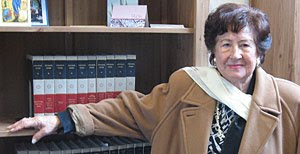Jenny Eisenstein's sad tale - Sent to Auschwitz at 13 yrs old, lives 2 years in "death camp", survives

From other "eyewitnesses" of Auschwitz, we know the Nazis immediately gassed all those under 16 years old.
So how did Jenny survive? A miracle, of course!
Survivor spreads message of hope
Folk singer honours lives lost in the Holocaust
By Nicole Miller
Posted: 2009-11-16
Vaughan Today
She was a little girl when the war broke out. By the age of 15, she had lost many family members and her freedom.
But she never lost hope.
Auschwitz survivor Jenny Eisenstein was only 11 when the world turned upside down.
The Thornhill resident has turned her life experiences into something positive. She is now a prominent interpreter of the poetry and music of the Holocaust as well as a Yiddish and Hebrew folk singer.
Eisenstein performed at the Musical Presentation of the Jewish Spirit event Nov.1 at the Anglican Church of the Messiah to mark the start of Holocaust Education Week. She sang songs originating from the ghettos and camps in remembrance of the victims and the heroes who lost their lives.
Eisenstein says she offers her talent to help educate and inform people about the Holocaust, and to instill in her audiences an appreciation of life.
“I really want to cement in them the value of freedom and loving people.”
Music has always been her passion. Eisenstein was a part of the school choir and would surround herself with people interested in music.
“God blessed me with a voice and somehow I became the family singer, if there was a party or birthday I would be the one to entertain as a child.”
She enjoyed the limelight and would never refuse an opportunity to use her talent.
“If they asked me to sing I would sing, not realizing how important it would be for my life, for my survival.
“This was my life,” she says, “and then the war broke out.”
Her dreams of becoming a singer had to be put on hold when the Nazis invaded her home country of Poland.
“Any person that survived, we all try to remember to teach the children, teach the world how tragic it is to be caught in a war and not be able to pursue your life’s dreams.”
Her family was eventually moved into the Bendzin ghetto where she sang with the ghetto’s choir. The ghetto was eventually liquidated.
She recalls her mother making sure both her and her sister always looked their best, even when they were put on the train to Auschwitz. Today, she honours her mother’s elegance as she makes sure to periodically reapply her lipstick.
“I always want to look my best,” she says with a laugh.
Upon arrival at the camp her brother, cousins and two adopted siblings were selected to go to the gas chamber. Her sister, her mother and herself were transported into the camp to work.
She remembers a lot of women went to bed at night and didn’t want to wake up, but some found the strength to survive through collective encouragement.
“When you came into Auschwitz you tried to accept any kind of devastation as long as they left you alive.”
The scariest part, she says, was the constant selections that determined who lived and who would be taken to the chambers.
People would fight sickness and hunger “but nobody could fight the selections,” she says. “Once the selection took place, which happened very often, then you had no chance. When they took you away you were gone.”
For almost two years Eisenstein lived like this, but what kept her going was her belief.
“I was always brought up with belief, in a faithful way, we believed in God very strongly.”
When the camp was liberated, Eisenstein remembers the cries of joy, knowing they were finally free, and then the sadness that overpowered the joy as the survivors thought, “Now what? What are we going to do here? Where are we going to go?”
Eisenstein ended up in Sweden where she recuperated from the war, married and had a son. She immigrated to Canada in the early 1950s and gave birth to another son. Her husband opened a grocery store, and later the pair opened a bridal shop. But Eisenstein’s passion for singing never faded.
She remembers her first professional performance in Canada at the Victory Theatre on the corner of Dundas and Spadina: that was the beginning, she says.
Ever since then she has made appearances at events for organizations like the Holocaust Education Week to share her voice and deliver her message. She sings songs of hope and defiance.
“I find strength in them. Some of (the victims) are silent about it, and we shouldn’t be.”
Her songs bring audiences back to a time filled with sadness and hate.
“If I am not going to sing these songs then they will be forgotten.”
She doesn’t want to be hailed as a hero or put on a pedestal, she just wants to use her life experiences to spread a message of love and an appreciation of life, she says.
“We want to make sure, people like myself, to the world that this is not the way it should be,” she says. “All the people that were killed and gassed, they deserved to survive like I did, but they didn’t, so we have to remember them. And in their honour we are trying to tell the world that it doesn’t make sense to hate or to kill one another because it doesn’t lead to anything.”
In print: November 13, 2009, page 5.
Article: "Survivor spreads message of hope"
Note: use http://www.archive.org/ to find article if original link no longer works


































